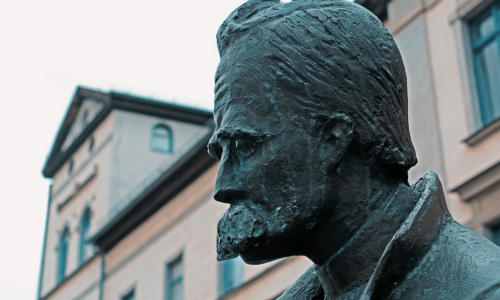Friedrich Nietzsche, the famous German philosopher and fierce critic of Christianity, made a startling claim:
“After Buddha was dead, his shadow was still shown for centuries in a cave—a tremendous, gruesome shadow. God is dead; but, given the way of men, there may still be caves for thousands of years in which his shadow will be shown. And we—we still have to vanquish his shadow, too.” (The Gay Science)
In this book, Nietzsche also wrote, “The Parable of the Madman,” where a madman mocks the very existence of God and concludes that the greatest deed in human history is the killing of God:
“Where has God gone?” he cried. “I shall tell you. We have killed him—you and I. We are his murderers. But how have we done this? How were we able to drink up the sea? Who gave us the sponge to wipe away the entire horizon? What did we do when we unchained the earth from its sun? Do we not feel the breath of empty space? Has it not become colder? Must not lanterns be lit in the morning? Do we not hear anything yet of the noise of the gravediggers who are burying God? Do we not smell anything yet of God’s decomposition? Gods, too, decompose. God is dead. God remains dead. And we have killed him. How shall we, murderers of all murderers, console ourselves? That which was the holiest and mightiest of all that the world has yet possessed has bled to death under our knives. Who will wipe this blood off us? With what water could we purify ourselves? What festivals of atonement, what sacred games shall we need to invent? Is not the greatness of this deed too great for us? Must we not ourselves become gods simply to be worthy of it? There has never been a greater deed; and whosoever shall be born after us—for the sake of this deed, he shall be part of a higher history than all history hitherto.”
The irony? Nietzsche, who used a “madman” character to gloat over God’s supposed death, himself descended into madness. Before turning 50, he collapsed in the streets of Turin, Italy, having completely lost his mental faculties.
To be fair, it’s not difficult to see why Nietzsche became disenchanted with “Christianity.” He was raised in a rigid, legalistic household and likely never witnessed a genuine, vibrant relationship with God. Disillusioned, he turned to atheism, viewing the traditions of Christianity as repressive. Sadly, much of what passes for “Christianity” today mirrors what Nietzsche despised: cold religion that suppresses joy, fosters fear, and distorts God’s true nature.
The God Nietzsche Likely Saw.
Many religions present a “god” that frightens people into blind obedience while offering no assurance of love, grace, or eternal security. For example, in the Islamic religion, entrance into paradise requires following the five pillars, but the only guaranteed way is through an act of jihad. Many other human religions require good works without ever defining a clear standard for “enough.” These systems often breed fear, control, and judgment, empowering leaders to exploit followers. If this was Nietzsche’s exposure to “God,” then it’s no wonder he rejected Him. Tragically, this distorted image is what I fear 95% of the world sees.
The God of the Bible Is Different.
The “god” Nietzsche rejected is not the God revealed in Scripture. Almighty God describes Himself in His Word as loving, righteous, just, and faithful, and personal:
“My God shall supply all your need according to His riches in glory by Christ Jesus.” Philippians 4:19
“For I know the thoughts that I think toward you… thoughts of peace and not of evil, to give you a future and a hope.” Jeremiah 29:11
“Fear not, for I am with you… I will strengthen you, yes, I will help you.” Isaiah 41:10
“For God so loved the world that He gave His only begotten Son…” John 3:16
“We know that all things work together for good to those who love God…” Romans 8:28
God’s true followers know Him as the fountain of real love. (1 John 4:8) And if God were dead, love itself would be dead. But God is very much alive—actively inviting people into a relationship of love. He paid the ultimate price so we didn’t have to.
A Warning to Believers
It’s easy to point fingers at Nietzsche and others who outright reject God. But Scripture warns us that even born-again believers can live as though “God is dead” in their daily lives—by ignoring His Word, neglecting prayer, and hardening their hearts to His voice.
When we repeatedly push God to the margins of our lives, we dull our sense of His presence. Over time, His nearness no longer feels real to us—not because He has left, but because we’ve walked out on Him. This spiritual neglect leads to anxiety, emptiness, and a maddening chase after meaning in everything but Him. Our disenchantment with God is what produces the Nietzsche’s of this world. If God is not our source of joy, we have “left [our] first love.” (Revelation 2:4) To possess an abundant Christian life, we must daily seek Him, or our hearts will drift.
God promises:
“You will seek Me and find Me, when you search for Me with all your heart. I will be found by you, says the Lord.” Jeremiah 29:12-13
“Behold, now is the accepted time; behold, now is the day of salvation.” 2 Corinthians 6:2
Reflection Thought:
Self-assess: Does your life reflect someone who has killed God, or is God’s presence alive in you, and are you overflowing with the fruit of His Spirit and the wisdom of His truth?
Prayer:
Lord, forgive me for the times I’ve ignored You and dulled my sense of Your presence. I don’t want to live a life that’s spiritually numb or restless. Draw me back to You with a hunger for Your Word, a passion for prayer, and a deep awareness of Your nearness. Let my life show the world that You are alive and that Your love is better than life itself. In Jesus’ name, Amen.








